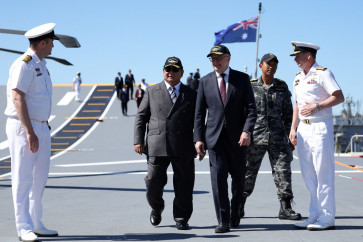Popular Reads
Top Results
Can't find what you're looking for?
View all search resultsPopular Reads
Top Results
Can't find what you're looking for?
View all search resultsAnalysis: Jakarta, Canberra move forward on stronger security treaty
Change text size
Gift Premium Articles
to Anyone
I
ndonesia and Australia are moving toward clinching a new, stronger defense treaty that could potentially affect the Indo-Pacific security landscape, particularly in the South China Sea, where tension has been building in recent years due to overlapping territorial claims between China and several Southeast Asian countries.
Security dominated the discussion between Australian Prime Minister Antony Albanese and President Prabowo Subianto during his first state visit to the southern neighbor. In their joint press conference aboard the Royal Australian Navy's flagship HMAS Canberra on Nov. 12 in Sydney, the two leaders announced that, following what Albanese described as substantive negotiations, they were ready to sign an enhanced bilateral security treaty between their countries.
The signing of the treaty, which builds on the 2006 Lombok Treaty and the defense cooperation agreement Prabowo signed in 2024 when he was defense minister, is scheduled for Albanese's upcoming visit to Jakarta in January 2026.
Details of the treaty have not been released, but Albanese said it would entail regular consultations at the head of state and ministerial levels, including when the security of either country was under threat. He also mentioned exploring joint and individual measures to deal with such threats.
This marks a new achievement for Prabowo, a retired Army general with a strong grasp of geopolitical and security challenges who has taken a keen interest in foreign policy since he took office in October 2024, making a flurry of overseas tours immediately afterward to cut deals. With Australia, the focus was on security.
The revamped Indonesia-Australia defense treaty could bridge the gap between the different ways each approaches the security situation in the Indo-Pacific.
Australia has formed various alliances, including a bilateral one with the United States (US), the trilateral group known as AUKUS with the US and the United Kingdom, and the Quadrilateral Security Dialogue (Quad) with the US, Japan, and India. Their common objective is to counter the emergence of China as a global superpower.



















